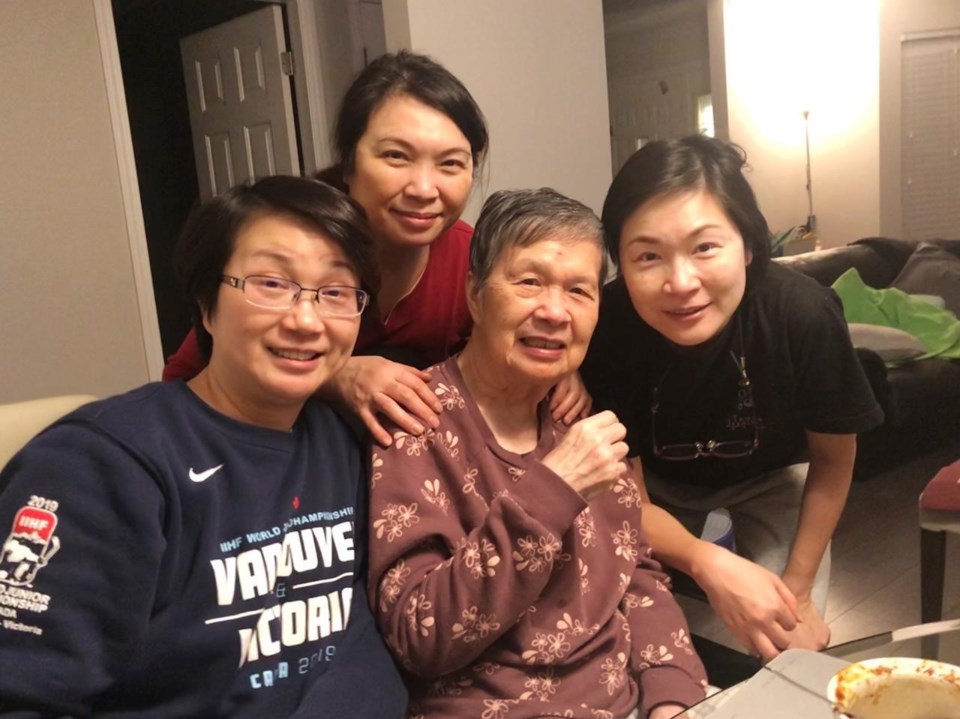VANCOUVER — Brenda Wong remembers her mother mixing up towels to clean the floor with those for scrubbing dishes. More confusing behaviour followed when a relative mentioned the family matriarch had called seven times within five minutes, each time seemingly unaware they'd already spoken.
Wong and her two sisters had no idea what was going on before taking Chui Foon Chou to her doctor.
When a neurologist diagnosed Chou with dementia in 2006, her daughters feared she'd soon lose her memory, even of them.
"We didn't have much knowledge about the disease," Wong said of her 86-year-old mother, who is now completely dependent on her "team" of daughters and home support workers who speak Cantonese.
The family has learned that dementia progresses gradually and its symptoms go beyond forgetfulness, fuelling frustration and requiring a large dose of patience from those who have it and their loved ones as their caregiver roles expand.
Some Asians keep dementia a secret to protect the family from embarrassment, said Wong, who believes more education is allowing people to seek help and speak openly about a condition that affects every community.
By 2050, almost one out of every four people who develop dementia in Canada will be of Asian origin, a 785 per cent increase from 2020, says a report released this week by the Alzheimer Society of Canada.
The report, based on modelling by the Canadian Centre for Economic Analysis, says the overall number of people living with dementia is projected to rise to one million by 2030, nearly triple the current amount. It focuses on the diversity of people who will be developing dementia as the population ages, and the need for services to be tailored for various racialized groups.
Lead author Joshua Armstrong, a research scientist with the Alzheimer Society, said a large segment of Asiansin Canada from countries including China, India, Japan and Korea have language barriers, making assessment of dementia more challenging.
Many of them moved to Canada in the 1970s and their dementia is being driven by their age, not a higher risk as a group, he said, though some people have a greater risk based on genetics. High blood pressure, physical inactivity, poor diet and diabetes are among the modifiable risk factors.
"There's stigma associated with dementia, so that is definitely one thing that we are trying to tackle," he said of the need for culturally safe services.
Dementia refers to a set of symptoms caused by disorders affecting the brain. Alzheimer's and vascular disease, for example, contribute to dementia, which causes thinking and memory to worsen over time and affects mood as well as awareness of people, places and time.
It's too soon to know how COVID-19 will affect the number of dementia cases in the future because the study is based partly on the 2016 census and limited academic literature.
"Any sort of negative impact on the brain is typically associated with increased dementia risks. We know that the virus does have an impact on the nervous system so we are definitely concerned that this might have an impact on dementia rates," Armstrong said.
Sharon Tong, who works for the Alzheimer Society of B.C. to support services provided to the Chinese community, said some older people in particular fear asking for help because they believe dementia is a mental illness.
A helpline is available for callers to anonymously ask questions in Cantonese and Mandarin, said Tong, adding most inquiries revolve around memory loss and whether that is solely related to aging. The line also offers support in Punjabi, Hindi, Urdu and English.
"They are aware that dementia is not curable and they will quickly jump to end-of-life (issues). And they really worry a lot about long-term care and that they may not have the ethnic food in a facility, and the language barrier, that they may not be able to communicate effectively," she said.
While an aging spouse and adult children caregivers are often struggling to cope, stigma prevents them from accessing services such as home support and even going to a doctor until the later stages of the disease, Tong said.
A successful one-year pilot project called Coffee and Chat has recently become a regular weekly gathering for 15 people living with dementia and is offered by the society at a community centre in Richmond, B.C., home to a large Chinese population.
"They feel free to talk about what they want to talk about. If, in the middle of the conversation they lose track, others don't mind."
Tong said people play card games, do puzzles and chat in the group, but it has a wait list. Another group, for those with early-stage dementia, includes family members.
The Alzheimer Society of B.C. will be hosting its first forum on dementia next month in Surrey for the South Asian community.The report says that some families have noted a lack of South Asian representation in educational materials and videos about dementia.
The Alzheimer Society's report also notes that an increasing number of Indigenous people are developing dementia and that their risk is high due to social disadvantages that affect factors including diet and adherence to medication.
Rebecca Labilloisof the Ugpi’Ganjig First Nation in New Brunswick said she and her siblings looked after their mother with "no support" from a local health centre before her death in 2013.
Her parents were both veterans so her mother was eligible for some services, but few culturally appropriate supports are available in the community even now, Labillois said from Eel River Bar, N.B.
She called for more training and hiring of Indigenous health-care and support staff who have an understanding of traditions including smudging.
"For people who don't have these services, I feel for them."
This report by The Canadian Press was first published Jan. 24, 2024.
Canadian Press health coverage receives support through a partnership with the Canadian Medical Association. CP is solely responsible for this content.
Camille Bains, The Canadian Press




